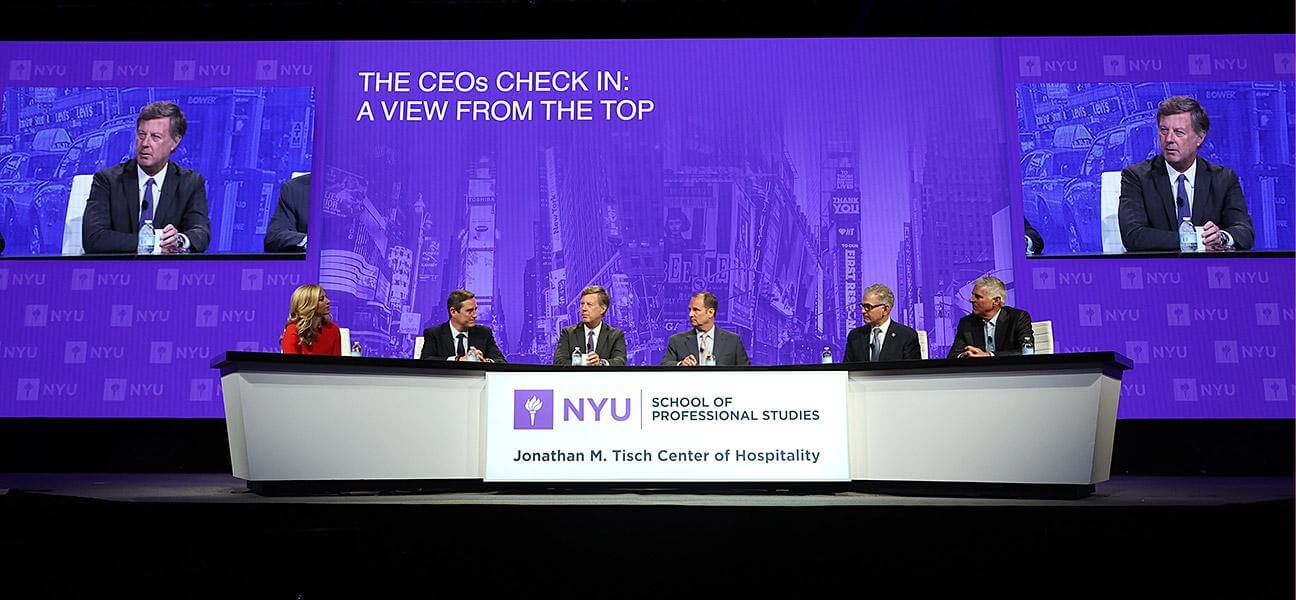Much like its host city, the 44th Annual NYU International Hospitality Industry Investment Conference, held at the New York Marriott Marquis, was alive with activity reminiscent of that before the arrival of the COVID-19 pandemic.
The NYU School of Professional Studies Jonathan M. Tisch Center of Hospitality convened top hospitality industry executives and thought leaders from across the U.S. and around the world for a deep dive into the current state of the industry and what is to be expected in the months to come.
“The CEOs Check-In: A View from the Top,” featured hospitality executives who discussed the evolving investment landscape, and how the hospitality industry is growing once again. Sara Eisen, anchor, “Closing Bell,” CNBC, moderated this discussion with Keith Barr, CEO, IHG Hotels & Resorts; Sébastien M. Bazin, chairman/CEO, Accor; Anthony Capuano, CEO, Marriott International; Mark S. Hoplamazian, president/CEO, Hyatt Hotels Corporation; and Christopher J. Nassetta, president/CEO, Hilton.
All of the CEOs were optimistic regarding the resiliency of the industry and the pent-up demand for travel caused by the pandemic. However, they also acknowledged the continuing problem of the labor shortage and the fact that they must make hospitality jobs more attractive by offering flexible schedules and pay.
But, despite the wage increases, the industry is still facing a labor shortage. Bazin said that a reason for this is that the hours are not the greatest, especially compared to other industries. “It is a painful job, and [one] that you cannot do remotely,” he said. “The main reason why we lose people is because they have siblings or family friends around them who are working from home and, accordingly, have a better life. So, hospital nurses, construction employees, hospitality, why are we facing the same problem? [It is] for the exact same reason—if they can opt for the same pay in a job but they can actually have better free time and work remotely and less sacrifices, [why wouldn’t they]?”
Barr believes that a way to help the situation is immigration. “You need to encourage immigration to bring people into work in this workforce,” he said.
Hyatt’s Hoplamazian said the industry must modernize some of its hotel-level practices. “[It is about] how you schedule shifts and how you open up the opportunity for a parent who needs to care for an elderly parent or get their kid to school in the morning,” he said. “They’re not going to make a seven or eight o’clock stand up for housekeeping. It’s just not going to happen. We’ve been stuck in this completely, totally old-world thought about how you schedule your people. Every one of us is working on a more dynamic way of helping people to self-schedule. I think that’s really critical.”
Capuano agreed with Hoplamazian, adding that the retail industry has made these changes, “but, that is not a level of flexibility and creativity that our industry has broadly embraced.”
Despite this, Nassetta believes that things are getting better. He said that many of the issues that kept people from working—including those of health, childcare and government subsidies—have passed. “You had a big reallocation of the workforce,” he said. “You had the COVID winners and the COVID losers. Sadly, we were on the loser list, certainly in the beginning and are shifting over to the winner list. A lot of the workforce that did want to work that wasn’t at home for these or other reasons shifted into retail and technology and in other areas. So, it takes time for all that to sort of sort itself out.”
Look for more coverage of the conference coming soon in Hotel Business and on our website.
